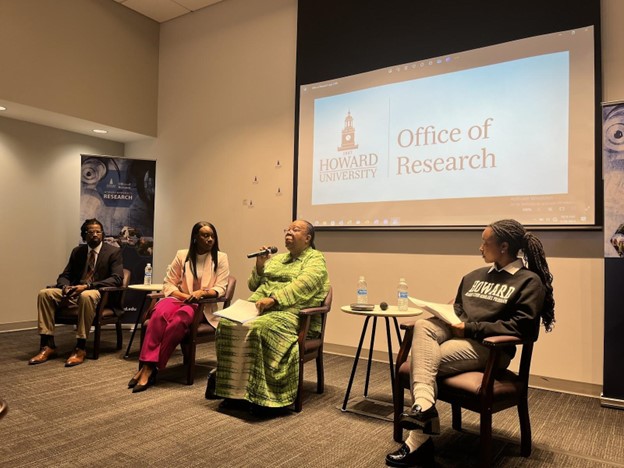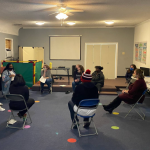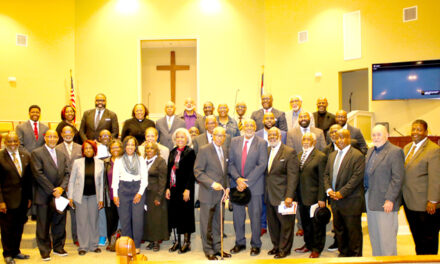By DaQuan Lawrence
AFRO International Writer
DLawrence@afro.com

Photo courtesy of Rodney Smith
During an international diplomacy trip to the United States, Dr. Grace Naledi Mandisa Pandor, who serves as South Africa’s Minister of International Relations and Cooperation, made a visit to Howard University (HU). Pandor is responsible for her nation’s foreign policy, and discussed numerous topics while inside of the HU Interdisciplinary Research Building.
Under the theme, “Speaking Truth to Power: 30 Years of South African Leadership on Black International Solidarity,” Pandor discussed South Africa’s position on the Israel-Gaza war, international solidarity and her suggestions for improving the efficacy of the United Nations (UN).
“Our position is with respect to the plight of the people of Palestine, and is not in any way anti-Semitic, nor against the continued existence of Israel,” Pandor said. “ clearly has always supported a two-state solution, and we believe this is the only way to arrive at a guarantee of peace and security for both Israel and Palestine.”
Pandor’s diplomatic visit occurs during a unique moment in history and geopolitical affairs, as the U.S. and South Africa, which have strong bilateral relations, find themselves on opposite sides of the political spectrum regarding the longstanding conflict in the Middle East. Both nations are also two of the 64 countries scheduled to hold general elections in 2024.
The event was organized by students in Howard University’s Department of African Studies and the Center for African Studies, and took place during the eve of the annual commemoration of the Sharpeville Massacre of March 21, 1960. The incident led to the death or injury of more than 200 Black South African protestors who were slain and injured while trying to change apartheid laws.
During her remarks, Pandor elaborated on the role developing countries and non-Western nations, such as South Africa, can play within the sphere of international affairs.
“The role that South Africa has assumed, is to try to increase the voice of what we call ‘the Global South,’ in the face of deepening inequalities and divisions in the international system,” Pandor said. “We do this because we believe the Global South is deserving of attention and deserving of support.”
Pandor continued, saying “when we refer to the Global South, we’re talking of those countries, regions and peoples of the world that don’t reflect a forceful power on global affairs and global institutions– who are the victims of institutions that should support them.”
Students said the event left them with much to think about.
“The event with Minister Pandor was eye-opening,” Jessica Moulite, a third-year Ph.D student at Howard University, said about the conversation. Being one of the three student panelists to engage with her and ask questions of a great world leader was a humbling experience.”
Originally from Miami, Moulite is focused on sociology for her doctoral studies and shared her perspective and takeaways from the event’s esteemed guest speaker. She said she enjoyed hearing “Minister Pandor emphasized the importance of calling out injustices and fighting for the world that we envision for us all.”
Before her tour of North America, Pandor, who is South Africa’s top foreign policy official, declared that she would focus on business opportunities and international diplomacy, during her trip to the U.S.
Throughout her visit, the minister held meetings with members of Congress, leaders from the private sector, faith community and advocates at think tanks, such as the Carnegie Endowment for International Peace. She met with anti-apartheid activists and interacted with students at HU, affectionately known as “the Mecca,” before heading to Jamaica for diplomatic meetings.
The South African Broadcasting Company reported that Minister Pandor’s visit to Howard University would be one of the highlights of her busy schedule. While discussing ways the international economic system can be improved for all nations, Pandor addressed how prestigious multilateral organizations such as the UN, could be enhanced to better serve historically marginalized nations and populations.
“We really are trying to marshal countries that have suffered under development, racism and colonialism to understand that they do have a collective power, which they can use more effectively, to influence the direction of world affairs,” Pandor said.
Pandor highlighted the role that multilateral institutions, such as the International Monetary Fund, the United Nations and the World Bank have in upholding current international governance mechanisms via international law.
“We believe the premier global institution to protect all of us universally and uphold our rights in the Global South, is the United Nations,” Pandor said. “We must address the reform of the UN, and in particular, the Security Council, as well as the Bretton Woods institutions (the International Monetary Fund and the World Bank) that are responsible for international development and finance.”
Moulite noted the importance of such commentary by an international politician and called attention to Pandor’s statements about international solidarity and the historical and contemporary importance of people around the world continuing to seek institutional justice, despite the current iteration of international law and governance.
“This fight is one that we cannot get tired of fighting,” Moulite said. “Not only are others depending on us– but we also have to fight for our ancestors in the struggle who also wished to see a better, more just world.”
The post South African Foreign Affairs Minister Dr. Grace Pandor visits nation’s capital appeared first on AFRO American Newspapers.











